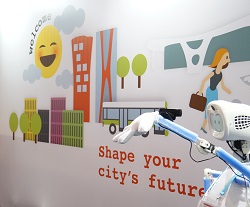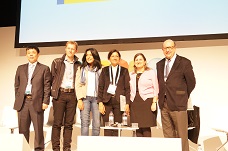
The Smart Cities Expo World Congress (SCEWC) is a meeting point for cities from across the globe bringing together public and private sector actors to share experience and knowledge on relevant themes such as technology, society, governance and mobility. The 2015 edition took place in Barcelona from 17-19 November, attracting international exhibitors, visitors and world renowned speakers to participate in a variety of activities including plenary sessions, keynote addresses and workshops.

UCLG Secretary General, Josep Roig was invited to moderate one of the sessions entitled "Prioritizing equity in new urban policies". There is a need for cities to address issues like social, cultural and economic exclusion which often affect women in particular since UN estimates suggest that two thirds of the world’s population now live in cities and that income inequality has increased since the 1980s. The session was a rich exchange of urban policies with international panelists guiding the audience around the world on “a journey through urban equity”.

The starting point was the region of Hebei in China where the large population, especially of school age citizens, puts stress on access to limited education resources. ChunLan Jiang, President of the digital education Collaborative Innovation Center, presented their solution, a cloud platform of digital education products providing targeted support to urban and rural schools. The innovative project won a World Smart Cities Award at this year´s congress.
The city of Vienna´s Director of Planning, Thomas Madreiter focused on innovation, quality of life and resource preservation, reimaging the concept of human centered cities which are
“innovation driven, not only technology driven”. The message was one of a holistic approach where social innovation is crucial to smart cities of the future. A contrasting talk by Zulma Bolivar from the Caracas Metropolitan Institute of Urbanism provided an insightful look at Venezuela, where inequality issues raise the question “how can we be a smart city when a large proportion of the population is limited by issues like mobility and security” with Plan Caracas 2020 and caracsenunclick two of the proposed strategies designed to address these major challenges in Caracas.

Poonam Sharma, Mayor of the Municipality of Chandigarh in India and Laurdes S.Casanova, director of the Emerging Markets Institute at Johnson Cornell University, New York closed the session. Sharma shared examples of eco mobility and environmentally sustainable transport models in the city of Chandigarh including pedestrian and cycle tracks and restricting the use of private automobiles to improve air quality, health and road safety while emphasizing that more autonomy and funding for the city were needed to achieve this. Casanova reflected on some of the points raised around poverty and echoed the need for the right conditions to make a city smart such as social inclusion and reduction of inequalities. Her take home message was one of a future where “education and a digital infrastructure” are tools to defeat poverty and create smart cities.
Finally, some reflections on gender and intergenerational inequality were shared and highlighted that promoting the participation of all women is essential for the development of smart cities.










